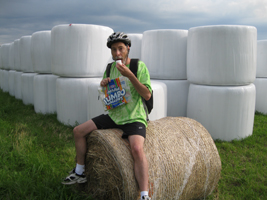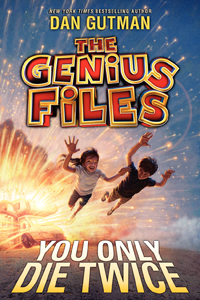Dan Gutman has written more than a hundred books for children—the Baseball Card Adventure series and the My Weird School series, among others—and sold millions of copies. His newest book, You Only Die Twice, is the third volume of the Genius Files series, which stars Coke and Pepsi McDonald, thirteen-year-old twins from the San Francisco area who are recruited into a secret group of young geniuses on a mission to solve the world’s problems despite repeated threats on their lives. In the first book, Mission Unstoppable, the twins take off in an RV with their parents—their father’s a history professor; their mother’s the editor of an online magazine called Amazing but True—on a cross-country trip to their aunt’s wedding in Washington D.C. Soon they are dodging murderous villains and outsmarting zany attempts on their lives in nearly every state along the way.
 In Never Say Genius, the twins arrive safely, thanks to Coke’s near-photographic memory and his sister Pep’s swift ability to solve the ciphers left for them along the way in places as diverse as the inside of a soft-boiled egg and a video-game screen at a roadside arcade. In the process they survive all manner of mayhem: fire, explosion, electric shock, poison, boiling oil, hypothermia, heavy-metal music, and irate Chicago Cubs fans. Almost worse, their mother insists on stopping at every oddball roadside attraction they pass: museums devoted to Pez, yo-yos, the Donner Party, and Spam, and even the world’s largest ball of twine.
In Never Say Genius, the twins arrive safely, thanks to Coke’s near-photographic memory and his sister Pep’s swift ability to solve the ciphers left for them along the way in places as diverse as the inside of a soft-boiled egg and a video-game screen at a roadside arcade. In the process they survive all manner of mayhem: fire, explosion, electric shock, poison, boiling oil, hypothermia, heavy-metal music, and irate Chicago Cubs fans. Almost worse, their mother insists on stopping at every oddball roadside attraction they pass: museums devoted to Pez, yo-yos, the Donner Party, and Spam, and even the world’s largest ball of twine.
Gutman manages to combine practically painless geography lessons, goofy pop-culture references, and eclectic nuggets of American history with puzzles, humor, suspense, and lots of action. The author recently answered questions from Chapter 16 via email prior to a book tour which will include a stop in Brentwood.
Chapter 16: To what extent did road trips with your own family inspire the story of the McDonald family’s trip and perhaps some of the attractions they visit? Will the twins eventually make it to all forty-eight continental (or even better, all fifty) states?
Gutman: I’ve never driven cross-country, but I always wanted to. One year we flew to Denver, rented an RV there and drove to Las Vegas. That was great fun, and probably the most memorable trip our family ever took. I remember that the coolest stops on that trip were the unexpected ones. Like, we had never heard of the Great Sand Dunes in Colorado. But we stumbled upon it, decided to stop there, and it was so much fun climbing up to the top. I would say that to a certain extent, that trip helped inspire The Genius Files. In fact, the photo of the RV in the first book is the RV that our family rented on our trip.
 Coke and Pep will not hit all fifty states. That would take more than a summer vacation, I think. I had them take a northern route on the first half of the trip and a southern route on the second half of the trip so they would visit as many places as possible. These are the states the McDonald family has driven through so far in order: California, Nevada, Utah, Wyoming, Nebraska, Kansas, Iowa, Minnesota, and Wisconsin (first book); Illinois, Indiana, Ohio, Pennsylvania, and Maryland (second book); Virginia, North Carolina, South Carolina, Georgia, Alabama, Mississippi, and Tennessee (third book). In the fourth book, which will come out next year, they will go through Arkansas, Oklahoma, and (mostly) Texas. So if you live in any of those states, you should be reading The Genius Files!
Coke and Pep will not hit all fifty states. That would take more than a summer vacation, I think. I had them take a northern route on the first half of the trip and a southern route on the second half of the trip so they would visit as many places as possible. These are the states the McDonald family has driven through so far in order: California, Nevada, Utah, Wyoming, Nebraska, Kansas, Iowa, Minnesota, and Wisconsin (first book); Illinois, Indiana, Ohio, Pennsylvania, and Maryland (second book); Virginia, North Carolina, South Carolina, Georgia, Alabama, Mississippi, and Tennessee (third book). In the fourth book, which will come out next year, they will go through Arkansas, Oklahoma, and (mostly) Texas. So if you live in any of those states, you should be reading The Genius Files!
Chapter 16: The Genius Files books are filled with facts about geography, American history, and popular culture. Are there any guidelines you follow to strike a balance between educating and entertaining?
Gutman: Back in 1995, I wrote The Kid Who Ran for President just for laughs. But then I found that schools all over the country were using the book to teach how the electoral college works, how constitutional amendments are passed, and so on. So ever since then, I have been throwing little tidbits of information into my books so kids will learn something while they’re reading the story. Teachers seem to like it. But entertaining always comes first. That’s what I really care about—creating a story that is so captivating that kids feel like they’re watching a movie in their heads as they read. If they learn something along the way, all the better.
Chapter 16: In all three books, you often step away from the story and speak directly to your readers to suggest that they look up some historical fact or use Google Maps to follow along with Coke and Pepsi’s trip. Some authors might worry that sending readers to the computer could interrupt their engagement in the story, but we’re guessing you like to encourage a more interactive literary experience. True?
Gutman: Yeah. It never occurred to me that somebody might put down the book, go to the computer, look something up, and never return to the book. My thinking was that it would add to the experience of reading if they could supplement the story with maps, photos, music, web sites, and so on. To a lot of kids, growing up with the Internet, a page filled with only text feels like it’s lacking something.
Chapter 16: How has the Google Maps program (which you specifically thank in the acknowledgments section of each book) helped you as a writer?
Gutman: Coke and Pepsi take a cross-country trip in The Genius Files, but I didn’t. I didn’t go to all those wacky places, and I could not have written the series without Google Maps and also RoadsideAmerica.com. I couldn’t just randomly choose locations. For the story to be realistic, the twins need to stop at regular intervals and have things happen at those places. I had to very carefully plan out a route that made sense geographically and also gave the twins the opportunity to see interesting places. It was very painstaking. That’s why The Genius Files is the hardest thing I ever wrote.
Chapter 16: In the first book you refrain from providing a physical description of the twins because, as you explain, “Who cares? Do you really care what Coke and Pepsi look like? It’s boring.” And yet, you do often describe the meals they eat on the road. What is your philosophy about which elements of a story your readers are likely to find interesting and which details they would rather skip?
 Gutman: I have a short attention span, and I was a reluctant reader as a kid. To this day, when I read a novel, I have to take notes because I forget who the characters are and how they’re connected to each other. So I think I relate well to a lot of my readers, who are like that, too. I know what bores them, and what turns them on. They don’t like to read long paragraphs of description. They don’t care about the weather, what a room looks like, or the shape of [a character’s] nose. The only time I really describe anything in detail is if it’s important to the story.
Gutman: I have a short attention span, and I was a reluctant reader as a kid. To this day, when I read a novel, I have to take notes because I forget who the characters are and how they’re connected to each other. So I think I relate well to a lot of my readers, who are like that, too. I know what bores them, and what turns them on. They don’t like to read long paragraphs of description. They don’t care about the weather, what a room looks like, or the shape of [a character’s] nose. The only time I really describe anything in detail is if it’s important to the story.
The meals? Gee, I wasn’t even aware that I was describing meals. I must have been hungry that day!
Chapter 16: You have used Facebook to ask your fans to submit photos of specific road signs for inclusion in the books. It would seem safe to assume that you’re a fan of social media. How have these new avenues of access changed your relationship with your readers?
Gutman: I should pay my fans on Facebook and Twitter for all the help they have given me. People have shot photos that have appeared in The Genius Files, and they have given me ideas for character names and situations. It’s so much fun to post, for example, “Do any of you live near Memphis, Tennessee?” and five minutes later I’m having a dialog with a reader in Memphis who can help me with something I need to know for the story. And it’s also great to announce online that I will be appearing at a bookstore somewhere and have people show up because they follow me on Facebook or Twitter.
Chapter 16: Coke and Pepsi visit a number of fairly wacky museums devoted to unusual people and products. Do you have a favorite among them? What would your readers expect to find someday in the Dan Gutman Museum?
Gutman: Hmmm, that’s a tough one. Along the way, the twins visit the largest frying pan in the world, the largest egg in the world, the duct-tape capital of the world, the largest collection of outhouses in the world, the National Mustard Museum, the Bowling Hall of Fame, the factory where Snickers are made, a museum devoted to vacuum cleaners, a museum devoted to hot-dog buns, the Waffle House Museum, and my personal favorite, the Toilet Seat Art Museum. (That’s near San Antonio Texas.) I didn’t go to all those places myself, but I did visit the House on the Rock, the Rock and Roll Hall of Fame, the Museum of American History, and Graceland. I think my favorite was the House on the Rock in Spring Green, Wisconsin—maybe the most amazing museum in the world. The climactic scene of the first Genius Files book takes place there.
The Dan Gutman Museum? Ha! It would be pretty empty. I’m the opposite of a hoarder. I throw everything away. I need my life to be simple and uncluttered, or I can’t function.
Dan Gutman will discuss You Only Die Twice (The Genius Files #3) on January 29 at 7 p.m. at Barnes & Noble Booksellers in Brentwood.
Tagged: Children & YA





